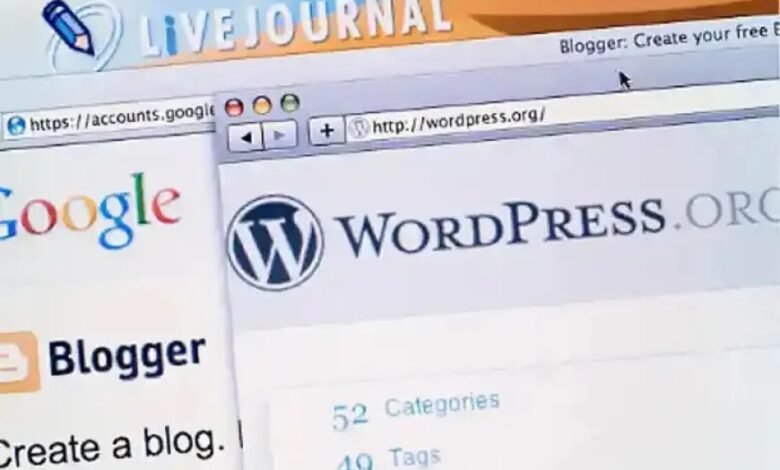Blogger and WordPress: A Complete Guide

In this guide, we analyze the pros and cons of Blogger and WordPress to guide you in choosing the most effective solution for your website.
Do you want to create your first blog? You’ve finally decided to start publishing content and have come to a crossroads. Don’t know if it’s better to choose between Blogger and WordPress. Don’t worry, you’re not the only one who has such doubts.
I have written this article specifically for you to provide you with in-depth guidance to help you decide whether to start with Google Blogger or WordPress. The web is full of posts trying to give an answer to this question “Which is better between Blogger and WordPress?”. The truth is that these are always viewpoints. Character is dictated by the writer’s subjective experience. In fact, it all depends on what you want to do, your computer skills, and your aspirations.
Before you start writing, or rather, before giving life to your project, you must necessarily sit down and make some calculations.
Yes, it is better to ask yourself certain questions right away, to understand what your real needs are, what your goals are, and above all if, for one reason or another, you are also willing to invest a little to improve the performance of your blog.
Choosing between Blogger and WordPress without thinking and without the slightest criteria will likely lead to disappointing results.
So I ask you to continue reading this guide carefully, as I will try to give you an overview of the most important features of the two platforms.
Choosing between Blogger and WordPress: Where do you want to go?
I tried to be as neutral as possible and only talked about my preferences with complete transparency in the end.
If I could give you some advice, be wary of those who want to impose their theses without considering all the different variables and contexts, which can certainly influence your choices.
If you don’t get your hands dirty, all the tutorials, guides, and books you read won’t get you anywhere, whether you choose to use Blogger or WordPress. However, I don’t want to delve into that too much.
Choosing between Blogger and WordPress: Blogger is perfect for beginners
As you already know, Blogger is a platform that Google bought in 2003 from a humble San Francisco company, Pyra Labs.
To date, the number of blogs created thanks to this service is approximately over 20 million, you can head to this linked post to learn more. It’s really easy to open your own account, especially if you already have a Gmail account. You will just have to enter the credentials you use to access your mailbox, on the official Blogger website.
In just a few steps you will have the opportunity to specify the name of your blog, choose the template you prefer, and that’s it. Don’t worry, if the template you set at first glance does not satisfy you, you can always replace it with others that Google provides you.
There are also many sites that offer third-party templates, often more detailed, which can be useful if you have finicky tastes.
In addition to the list, where each item is accompanied by a brief description, you will also find services that allow anyone to create their own form directly online. But not all of them are free!
Blogger recently released additional templates, all of which are responsive. They’re all nice to look at, but if you choose one of these templates, keep in mind that most of the tutorials for customizing graphics for your blog, which were published even just a few months ago, won’t be suitable.
In fact, the code you can step into will be a little different from the old standard templates available on the platform.
Blogger: its pros and cons
The Blogger dashboard is really intuitive, and thanks to the various sections divided into it, you can take care of all aspects of your site.
However, since it is a free solution, you will also have to deal with a series of limitations that can be quite annoying, especially if you intend to blog professionally. So let’s see what are the main advantages and disadvantages of using Blogger.
Positives:
- The difference between Blogger and WordPress in terms of programming is that if you do not have programming skills and want to start publishing content right away, this is ideal.
- Unless you decide to purchase a custom domain, which will cost you around $12, you won’t have to spend a dime to manage your site.
- Using the template designer, you can change the font, link color, background, header image, and main dimensions of your blog, without specific technical knowledge. Alternatively, if you’re a geek, you can directly intervene in the HTML and CSS of the template, in order to tweak it further.
- Integration with Google services Among your pages, for example, you can enter your AdSense code once you enable it and start earning through the traffic that you will be able to generate. Google Ads is fully supported.
- No spam, from the main dashboard you have the possibility to manage spam comments, with the moderation function set appropriately.
- Import and Export Blogger gives you the ability to upload or download, whenever you want, your content and the template you are using. I always recommend making a backup of anything you might want to reuse one day that you have on hand.
- Protection, In Blogger you are protected by Google itself and this is the main reason why I moved from WordPress to Blogger.
Negatives:
- Tools and add-ons There are many, especially if you are looking between those provided by third parties. However, in the long run, Blogger has limited plugins and you cannot load them into the platform as you can in WordPress.
- Indexing and Search Engine Optimization (SEO) Blogger is from Google, so your blog will be indexed well! Don’t make this logic absolute and remember that your site depends on the quality of the content you publish and your continuous on-page and off-page improvement activity. Unfortunately, you will need to know and use the plugins that Blogger does not offer (you should learn off-platform SEO before starting, you can head to this linked post to learn more).
- The domain or domain, your blog address will look like example.blogspot.com, and then a subdomain. Again from an SEO perspective, I think it’s more difficult to achieve a good degree of visibility starting from a situation like this.
- You are a welcome guest and Google offers you a part of its space; Despite the import and export functions that I told you earlier and the copyright laws, you cannot consider yourself the 100% owner of the property. In other words, you must read Google’s policy, understand it well, and apply it. If you violate the instructions, Google will permanently suspend your account.
WordPress: It is the right choice for professionals and merchants!
An explanation must be provided immediately. There are two sites dedicated to WordPress, the .org and .com versions.
WordPress.org, where you can download WordPress software for free, distributed under the GNU license. The first version of the CMS (Content Management System) was released in 2003 by its creator, Matt Mullenweg with the aim of allowing anyone to create and manage a website with complete autonomy and publish multimedia content.
You will only have to purchase a domain and rely on a hosting provider.
WordPress.com is a blog hosting service that gives you the ability to create a website for free, without installing anything, and in just a few steps.
It was launched in 2005 by Automattic, also founded by Matt Mullenweg. I will not stay here describing the features of this latest portal. It is a very similar solution to Blogger, the proposal from Google.
You have your own third-level domain, limited storage space (3GB vs. 1GB in Blogger), and a few basic features.
To get more space, take advantage of more useful and sophisticated UI elements, or completely customize your blog’s graphics, you can always switch to one of the paid plans offered by WordPress.com.
However, the two sites are still very different realities. From now on, I will only talk about the popular CMS, as software for downloading and uploading elsewhere, always keep that in mind. If you still want to learn more about the topic and know the main differences between them I suggest you read: WordPress is a free and open source content management system.
Returning to the question of whether it is better to choose between Blogger and WordPress, and more specifically the possibility of creating a blog by purchasing hosting and a custom domain, I will give you my point of view.
To implement your project in a tangible way and reach your goals more quickly, seriously consider investing, even if only a small portion of your budget, in creating and managing a self-hosted blog.
With WordPress, you will have many features available and a wide range of alternatives that you can choose based on your taste, and the skills you have or will be able to develop.
WordPress: its pros and cons
The main WordPress interface is definitely intuitive and easy to use. You can publish content, change the design of your blog, and manage all its technical aspects, in an easy-to-navigate working environment.
As I did with Blogger, I will now try to describe the main positive and negative characteristics of this powerful content management system.
Positives:
- Storage Starting with SiteGround’s StartUp plan, you’ll have 10GB of web space at your disposal. This is just one example. There are strong and fast hosting, but they are expensive.
- Ownership The blog you create in this way is yours, for all intents and purposes. Plugins and Widgets You can use as many plugins as you want, free or paid, depending on your needs. Remember to always check that it is updated and set correctly.
- Easy SEO Most sites built with WordPress are optimized for search engines. But be careful what you post, that’s what makes the difference! To learn more, I suggest you read our complete SEO guide.
- With customizable themes, you can manage the template code freely. To do this, you must know the PHP language.
- Setup Do you think that uploading WordPress to your webspace is complicated? Don’t worry, there are countless step-by-step instructions online. Moreover, some providers, when you purchase hosting from them, offer WordPress already installed and updated to the latest version.
Negatives:
- It’s up to you, do you consider the minimum expenses to start your blog a problem? Help yourself! But if you are a professional or want to become a professional, you should think about how much it will cost you, also in terms of time and quality of results, to calmly start with a free solution, with all the limitations that I told you about earlier.
- Start on the right foot! Of course, there is something to learn more from Blogger, but if you are inclined to increase your website development skills, thanks to the numerous communities and tutorials on the web as well, do not hesitate to choose WordPress.
- Protection is the main and important difference between Blogger and WordPress. Blogger, as previously mentioned, is 100% protected from Google itself, but as for WordPress, you are responsible for this matter.
Summary of choosing between Blogger and WordPress
Summarizing what has been said a little and trying to conclude the guide with some personal considerations, I would like to give you some advice.
If you do not have any IT skills, do not have commercial goals, and are not trying to become a reference point on the web, you can easily start gaining experience by opening a Blogger blog.
Maybe you want to know what kind of response you get from an audience when you write an article, or you just want to let your ideas flow. So yes, Blogger can help you.
On the other hand, if you have your own business, I say again, or if you want to build a personal brand in a profitable way, immediately focus on a self-hosted blog.
You will certainly give a more professional image of yourself, and if you have something good to offer, you will definitely be able to take advantage of the thousands of opportunities available on the net. All this is thanks to an attractive and easy-to-manage website.
Now the ball is in your hands! I would like to know your opinion about Blogger and WordPress. What experiences do you have? Which one do you prefer and why?
Constructive criticism is also welcome, I’ll be waiting for you in the comments, and remember to share the article with friends and acquaintances who might be interested in the topics covered. Greetings and see you soon!





